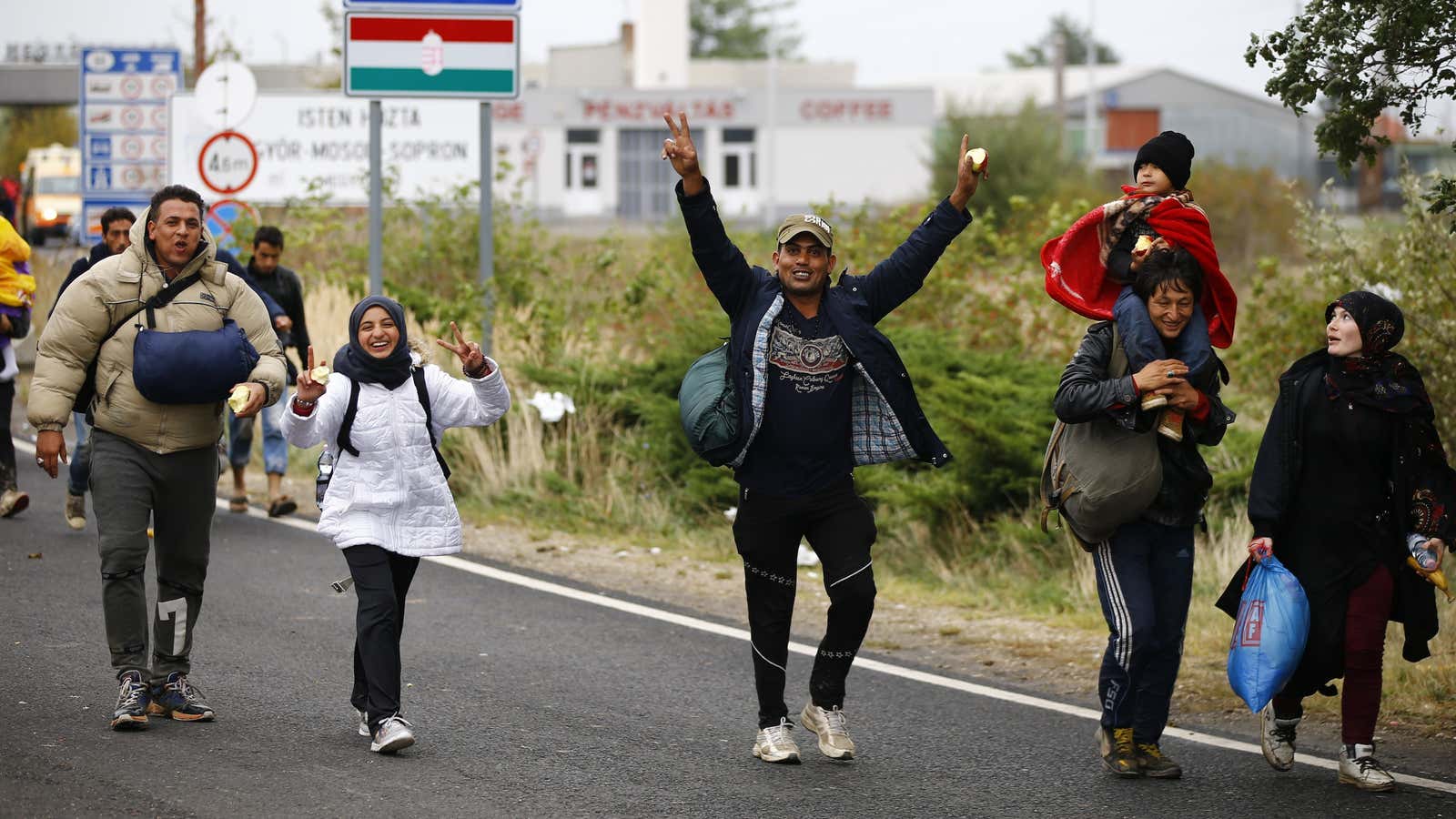Overcast skies, miserable rain, and cooler temperatures have recently descended on the tourist haven of Lesbos, Greece. European holidaymakers have packed up their sunscreen and bikinis, and shuffled back to their homes and offices, bidding one of their favorite beachside destinations good-bye for another season.
And yet, during the early hours of Wednesday morning, two and half thousand new arrivals stumbled and splashed their way onto the shores of this island in the Aegean Sea. Instead of arriving by plane or ferry, these visitors came on a flotilla of rubber dinghies; risking their lives through mounting waves and cold, driving rain, running from a country consumed by a war, without law, and a humanitarian crisis without end: Syria.
Desperation rapidly turned into weary relief as whole families clambered out of the boats and breathed in the sense of safety and freedom they had risked almost everything for. With boats capsizing on a routine basis, crossing the slim six-mile-wide channel between Turkey and Greece represents a risk to life that just shouldn’t be faced in the 21st century. And yet they are now in Europe, so it was all worth it—their little children may now have a chance to grow up, to learn that life doesn’t have to be filled with chronic hunger, the sound of barrel bombs falling from the skies, and the fear of being caught between the vicious opposing militia groups that now control the majority of their once civilized and cosmopolitan country.
While Syria as a complete nation has now all but ceased to exist, the post-apocalyptic image of their once great country has done nothing to extinguish the civility and hopes of normal Syrians. As an aid worker leading the International Rescue Committee’s humanitarian relief team in Greece, I’ve had the opportunity to talk to Syrians as they flee the war into Europe. I’ve worked with refugees around the globe in almost every war zone in the last 15 years; while the desperation for the safety and wellbeing of their families is the same the world around, one thing has struck me during all of the interviews I’ve done: I recognize the lives the Syrian refugees used to live, and want to live again.
Mohammed, a pharmacist from Aleppo, described to me his life before the war began: He owned his own home and car, his children attended schools they enjoyed, and he and his wife had been saving so that they could afford them university tuition when the time came. He spoke of the fear that drove him to leave Syria—of the constant sound of fighting—and the hope that he would be welcomed into Europe, and allowed to learn the language, and do his part to fit in and contribute to this new country by working wherever he could find employment. He hoped that someday he could once again be a pharmacist. He described how he had spent time on the journey shaving and ensuring his hair was clean, ensuring that he had clean clothes on, as he wanted more than anything to be seen as a trust worthy, educated person rather than just a refugee.
The stories continue along a similar thread, engineers who had spent their careers building office blocks and multi-story car parks; doctors who tried to stay in Syria to help their own, but were forced to flee as their colleagues were assassinated; young men and women who have seen their universities destroyed, fleeing the violence and hoping to be given the chance to complete their education.
I recognized the lives and families of the refugees I interviewed because they’re so similar to my own life, and the lives of my own family and colleagues. The families that are seen clambering out of dinghies and waiting in train stations across Europe once had lives that were the same as ours. Their daily lives have been changed by the violent implosion of their country, but more importantly, they remain educated professionals, top-flight students and loving mothers now looking for safety and the chance of reclaiming control over their own lives. So many of these new arrivals into Europe will expand the economies they find employment within, bringing not only much needed skilled and unskilled human resources, but also paying into their local taxation system for the wages they’re so happy to earn.
Mohammed, the proud Syrian pharmacist, made it to Germany not long after we spoke. He commented on how kind his new neighbors were, and how grateful he was to have been afforded such a warm welcome. He was excited to start on this new journey to find work and start contributing to the country that had offered him the chance to seek asylum. Mohammed’s story is so very similar to so many others that together form the societies we all happily live within—societies rich because of the experience, skills and work ethic that immigrants and refugees bring.




